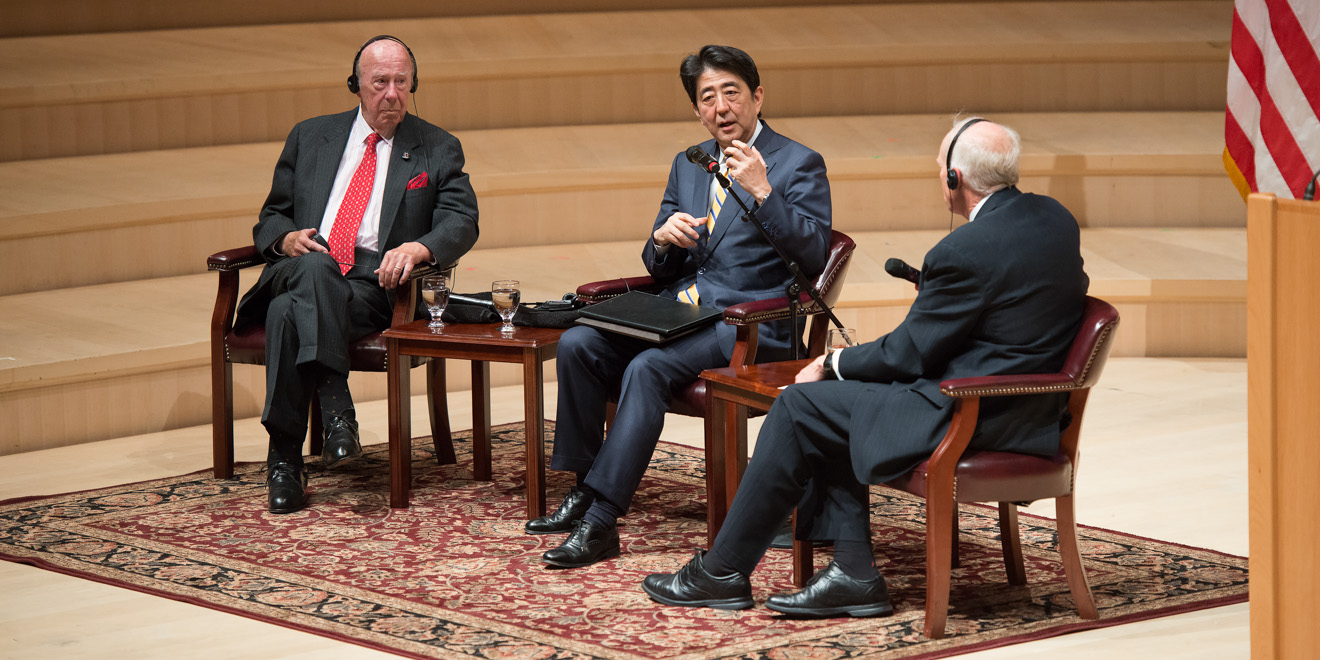The shockwaves triggered by Shinzo Abe’s assassination on July 8 were immediately felt by hundreds of millions across the world. But the reverberations of the former Japanese prime minister’s death won’t stop there, according to Stanford experts. They predict that the impact of Abe’s assassination on global and domestic Japanese politics could extend far into the future.
Abe was shot twice during a campaign speech in Nara, Japan ahead of a major July 10 Upper House election, a fatal anomaly for the nation unaccustomed to gun violence.
According to professor of sociology and director of the Japan Program at Stanford Kiyoteru Tsutsui, the policy implications of Abe’s death are abundant.
“With the victory in the Upper House election on [July 10], which was helped by the nation-wide sympathy toward Abe, Prime Minister [Fumio] Kishida now has three years without any mandate to hold national elections, and he can carry out his policy goals in that period,” Tsutsui wrote in a statement to The Daily.
Without Abe’s influence, Tsutsui predicts, Kishida will have more flexibility in pursuing his left-of-center political agenda, including “less hawkish foreign policy, less of a commitment for constitutional revision and a more egalitarian distribution of wealth.”
During his lifetime, the former prime minister wielded immense political power, even after resigning in 2020. Within his Liberal Democratic Party, “Abe was still an influential power broker” at the time of his death, according to former assistant professor of political science Phillip Lipscy. “His opinions on issues like nuclear weapons and Japan’s Taiwan policy still often made headlines.”
U.S. president Joe Biden expressed similar sentiments, pointing to Abe’s legacy of efforts to improve the nation’s economy and strengthen its military. Abe served as prime minister from 2006 to 2007 and 2012 to 2020 before stepping down due to health complications. During his two terms, he was known for his economic vision, dubbed “Abenomics,” to elevate Japan on the world stage.
“Prime Minister Shinzo Abe was a towering figure in Japan [and] the longest-serving prime minister in the country’s history,” Charles Crabtree, a former visiting assistant professor with the Japan Program, wrote in a statement to The Daily.
Positioning himself at the head of many defining policy battles, Abe led the resurgence of Japan’s Liberal Democratic Party, according to Crabtree. “While I don’t want to lionize Abe, who can be criticized for his policy positions and approach to democratic governance, his importance to modern Japanese politics cannot be overstated,” he wrote.
The former prime minister’s tenures were not uncontroversial. In 2015, Abe faced criticism after passing a series of bills that allowed Japan’s Self-Defense Forces to assist allied nations under attack and to conduct peacekeeping operations abroad. The passage of the security bills marked Japan’s departure from its longstanding post-World War II policy of pacifism.
Abe also received international backlash for reportedly undermining media freedoms in 2016, and in 2018, he came under fire after refusing South Korea’s call for a formal apology for Japan’s WWII-era system of comfort women.
Abe’s assassination also raised questions about Japan’s strict gun laws. With just one reported death linked to gun violence in 2021, Japan’s strikingly low homicide rate is attributed to its historically strict gun laws, which require that an individual pass both a medical examination and an extensive background check, along with other prerequisites. The suspect was seen using a homemade gun and was later found to possess other improvised weapons at his home near the assassination site.
“The assassination was particularly shocking since Japan is arguably the least likely country for such gun violence,” Tsutsui wrote. “The fact that it was a hand-made gun that was used in the attack attests to the efficacy of gun control in Japan but also points to the problem of regulating the market for hand-made guns.”
Chief Cabinet Secretary Hirokazu Matsuno said in a news conference that Japanese authorities may consider adding stricter regulations on homemade guns, despite the already-existing gun laws that prohibit Japanese citizens from carrying a gun without a permit.
Amid the flurry of condolences from global leaders since Abe’s death, Stanford experts have also voiced optimism, explaining that international doomsaying can be exaggerated after moments like these.
“Abe’s assassination is a shocking event, but we should be cautious about drawing broader conclusions about Japanese society: Japan remains a robust democracy and one of the safest countries in the world,” Lipscy wrote.
